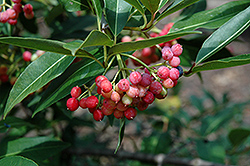It's all about ...
plants

Narrowleaf Viburnum
Viburnum nudum 'Angustifolium'
Height: 8 feet
Spread: 6 feet
Sunlight:
![]()
![]()
Hardiness Zone: 5a
Other Names: Narrow Leaved Possum Haw, Smooth Witherod
Description:
An exquisite variety with fine narrow deep green foliage; showy flat-topped clusters of creamy white flowers in spring followed by clusters of berries that progress from pink to blue; a dense low maintenance plant, ideal for the shrub border
Ornamental Features
Narrowleaf Viburnum is bathed in stunning fragrant creamy white flat-top flowers with buttery yellow eyes at the ends of the branches in late spring. The royal blue fruits are held in abundance in spectacular clusters from late summer to late winter. It has dark green deciduous foliage. The glossy narrow leaves turn an outstanding plum purple in the fall.
Landscape Attributes
Narrowleaf Viburnum is a dense multi-stemmed deciduous shrub with an upright spreading habit of growth. It lends an extremely fine and delicate texture to the landscape composition which can make it a great accent feature on this basis alone.
This is a relatively low maintenance shrub, and should only be pruned after flowering to avoid removing any of the current season's flowers. It is a good choice for attracting birds to your yard, but is not particularly attractive to deer who tend to leave it alone in favor of tastier treats. It has no significant negative characteristics.
Narrowleaf Viburnum is recommended for the following landscape applications;
- Accent
- Mass Planting
- Hedges/Screening
- General Garden Use
Planting & Growing
Narrowleaf Viburnum will grow to be about 8 feet tall at maturity, with a spread of 6 feet. It tends to fill out right to the ground and therefore doesn't necessarily require facer plants in front, and is suitable for planting under power lines. It grows at a slow rate, and under ideal conditions can be expected to live for 40 years or more.
This shrub does best in full sun to partial shade. It prefers to grow in average to moist conditions, and shouldn't be allowed to dry out. It is not particular as to soil type or pH. It is highly tolerant of urban pollution and will even thrive in inner city environments. Consider applying a thick mulch around the root zone in winter to protect it in exposed locations or colder microclimates. This is a selection of a native North American species.
This plant is not reliably hardy in our region, and certain restrictions may apply; contact the store for more information.
